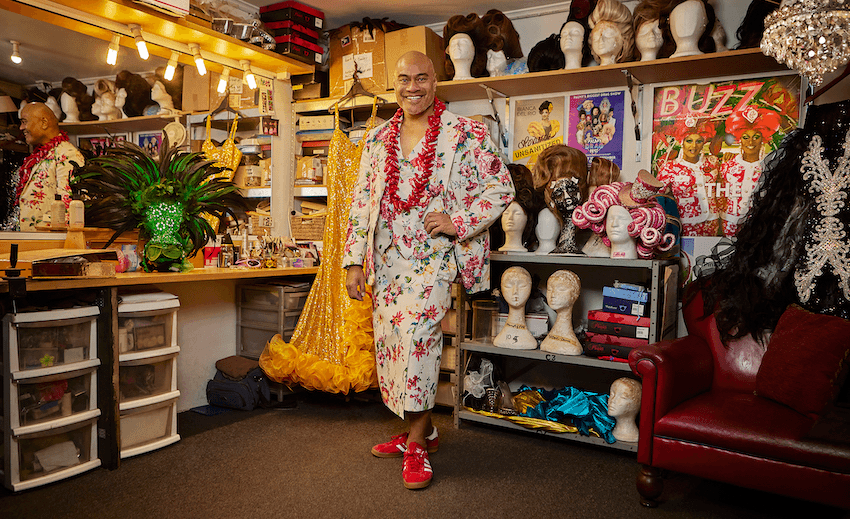While police in uniform have been banned from the Auckland Pride Parade, organisers of the Wellington Pride Parade have said that uniformed police officers will still be welcome. Below, a statement from members of the Wellington LGBTQi community denouncing that decision.
We are a collective of queer people who live around Te-Whanganui-a-Tara. We are disappointed by the Wellington International Pride Parade’s decision to invite uniformed police officers to next year’s parade. This decision was made without community consultation, and it sends a message to those in the community who are vulnerable to police brutality that they are not welcome.
In recent weeks, the Auckland Pride Board’s decision to not allow the New Zealand Police to attend the 2019 Auckland Pride Parade in their uniforms made national news, drawing attention and commentary from all walks of life in Aotearoa. Among these was the Wellington International Pride Parade, which starkly distanced itself from Auckland Pride by issuing a statement that it intends to openly accommodate the New Zealand Police in full uniform.
The Auckland Pride Board’s decision has attracted a lot of scrutiny from both within and outside of our community. It has been widely framed as an “exclusionary” move for a supposedly inclusive event where we should be celebrating how far we have come, and welcoming any person or institution who wants to be a part of that. Regardless of how we feel about the decision, it must be emphasised that it was made after seven public consultation hui, where multiple perspectives from the community were heard and taken into consideration.
The Auckland Pride Board listened to the voices of its constituents, and we are severely disappointed that no such consultation has taken place in Wellington. Community consultation has happened in previous years in Wellington, but this year the Wellington International Pride Parade has failed to engage with the community it claims to represent.
At the most recent Auckland Pride hui, statistics presented to the audience showed that, despite the Police’s talk of progress, disproportionate brutality against Māori by police officers is getting worse:
In 2014, Māori were 7.0 times more likely than Pākehā to be victims of police brutality.
In 2015, Māori were 7.1 times more likely than Pākehā to be victims of police brutality.
In 2016, Māori were 7.4 times more likely than Pākehā to be victims of police brutality.
In 2017, Māori were 7.7 times more likely than Pākehā to be victims of police brutality.
The NZ Police has failed to address and reduce its disproportionate violence against Māori for four consecutive years. Instead, we have seen violence against Māori rise continually. Instead of acknowledging this problem, and agreeing respectfully to attend out of uniform, the NZ Police has fully withdrawn its support and presence from the Auckland Pride Parade.
Asking the NZ Police to wear rainbow t-shirts or plain clothes to the parade is not exclusionary. Officers are not being excluded; their uniform, and what that uniform represents, is. It is a very reasonable compromise, and one with growing precedent across the world in cities like Minneapolis, Madison, Toronto, Calgary, Vancouver, Edmonton, and beyond.
The NZ Police had the opportunity to graciously accept a compromise borne out of community consultation, acknowledging the need to do better to reduce the violence against our Māori and takatāpui whānau. Ideally, the Police would engage sincerely with our community to heal grievances both recent and historical. It was the Police’s repressive violence against queer people, after all, which motivated queer people to take to the streets and show our pride in the first place.
Instead, the Diversity Liaison Officer Tracy Phillips’ decision to withdraw the NZ Police shows that it only wants to be included for PR purposes. Withdrawing at the first sign of constructive criticism does not inspire hope that the Police actually wants to build a real relationship with the queer community.
By including uniformed police, we implicitly say to the NZ Police that its ongoing, escalating, and disproportionate violence will be tolerated by our community. We fail to provide the NZ Police with an incentive to reduce its brutality against Māori. We tell the most vulnerable people in our community that making sure uniformed police officers feel welcome at our events is more important than their right to feel safe.
Pride was, is, and always must be for our community. This requires accountability to the people it represents. We call upon the Wellington International Pride Parade organisers to hold a community consultation hui, hear our case, and reconsider its decision to welcome the NZ Police in uniform.
Sincerely,
Josh Beck, Tabby Besley, Bella Bolter, Andi Buchanan, Katjoesja Buissink, Danielle Calder, Erica Cassie, Ellie Clayton, Harold Coutts, Emma Cullen, Samantha Curry, Rei-Marata Goddard, Gabriel Grant, Adeline S. Greig, Chaz Harris, Kassie Hartendorp, Steven Hay, Ethan Herbert, Jem Hewett, Joshua James, Karen Kotzé, Danny Lam, Rosie Leadbitter, Alis Lean, Denzelle Marcovicci, Maia-Jeanne McAllister, Aya McCabre, Jamie McClymont, Kate McIntyre, Kelly Mitchell, Bo Moore, Oscar Nelson, Viveka Nylund, Hilary Penwarden, Dani Pickering, Ben Reyburn, Geraint Scott, Courtney Shannon, Bella Simpson, Simie Simpson, Joshua Sims, Nicole Skews-Poole, Mirky Tannit, Angela Wells, Aliyah Winter, Dani Yourukova.
The Bulletin is The Spinoff’s acclaimed, free daily curated digest of all the most important stories from around New Zealand delivered directly to your inbox each morning.



